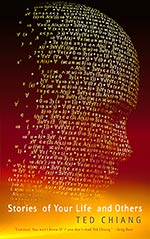
![]() Bormgans
Bormgans
5/23/2015
![]()
This collection of stories is highly polished, and certainly shows the author's skill to compose short stories - at the same time, it's all fairly standard composition: Chiang surprises you in the story when you expect to be surprised. So, polished, yes, but sterile too. Moreover, there's hardly any interesting characterization.
Yet the real reason this collection won't be read anymore 50 years from now, when the hype has passed, is that Chiang is first and foremost a writer of artificial ideas and philosophical concepts, not of stories. This became obvious fairly quickly when reading this book, and the author's 'story notes' at the end confirmed it. Basing art on ideas is not necessarily a bad thing, as most literature starts with an idea or a message an author has or wants to convey. The problem is that Chiang doesn't try to hide his ideas, but leaves them out in the open, glaringly obvious. Nothing is left to the reader's own mental devices. A story shouldn't be a treatise nor a sermon. I am of the firm conviction that most Great Literature uses ideas as an invisible base on which to build a plot, not as the explicit surface level message. It's the difference between a Book that makes you think, and a book that tells you what to think.
My thoughts on the individual stories:
The first two stories (Tower of Babylon, 29 pages and Understand, 40pp.) have a great build up, but both suffer from a disappointing ending. One is left with the feeling: "did I read all these good pages to arrive to this?" Tower of Babylon is not a science fiction story at all, for those who would care. All and all, after these 2, I was curious and eager to read more.
Devision by Zero (20pp.), is well constructed, but ultimelty unbelievable. Its mathematical premisses is preposterous, and if it were like it is described in the story, and nobody - including other well respected mathematicians - would find a fault in the proof of a humongously important mathematical claim, it would cause a giant stir in science/math land. Yet nothing like that even happens, it reads like nobody seems to care. To make things worse, it also features a mistake, and that's not a good thing for a story that relies so much on theory. If one could prove 1=2, math itself wouldn't become just empirical, as the main character says & regrets, but the opposite: it would become something non-emperical. By the way, this is only an SF story in the way Stephenson's Baroque Cycle is, not so much.
The fourth tale, Story of Your Life (60pp.), may hold something of interest for those uninitiated in Linguistics 101. But everybody with a bit of basic knowledge about language and writing systems won't find much here, except their old course books disguised as a story. Moreover, the main premises (which is spoiled on the back of the book, so forgive me doing the same here) - that a human can predicted the future because she learned an alien language - is again preposterous. The fact that Chiang tries to sell it to the reader via some half baked science and philosophy makes it even worse. Don't try to write hard science if you are actually writing magic. There's also an emotional side to the story, that deals with grief for a dead child, but the heavy handedness of the linguistics and the unbelievable premise get in the way of actually conveying emotions.
Seventy-Two Letters (50pp.), starts of with a spectacular first scene. It is not an SF story, but something in the realm of magical realism. Finally, I thought - this must be the stuff all those high praise reviews rave about. It quickly becomes boring though, filled with lifeless dialogue, and a story of which the plot is more the result of 2 thought experiments (what if golems have been real, and something else) instead of the want to write about a succession of interesting events and/or character development. At this point in the book, I began to sense this is more or less Chiang's standard way to approach writing.
Next up is The Evolution of Human Science, not even 3 full pages long. It's a sketch of a few ideas in the form of a fictional scientific magazine article, no story.
Hell is the absence of God (32pp.) features the same trick as Tower of Babylon and Seventy-Two Letters: what if X were real? As this time the X are angels, this too is no SF at all. It's a good story, but again the ending is mildly disappointing. And again I have the feeling Chiang wants to drive something home, more than to tell a story.
The final piece, Liking What You See: a documentary (38pp.) is the worst of the entire collection. Chiang introduces the concept of 'lookism' (cf. sexism, racism,...) and a pill that disables one to see people's beauty, and lets an array of characters ponder about that in diary fragments and the likes. This alternative, 'clever' narrative structure disguises the fact that this is again no story, but a tedious homily filled with clichés about beauty and its place in human society.
---
This is the sort of book that makes some readers feel special because they get all the tidbits of science and philosophical stuff that's mentioned, and at the same time appreciate the author's smooth chiseled way with words. So, popular award stuff for sure, all the more since it seems deep & serious, but ultimatly goes down easily, because it's shallow in essence, having only one level. Undeniably, Chiang has heaps of skill. But he needs to stop trying to come across as a 'sharp', multi-disciplinarian intellectual with a soft touch, and write some real goddamned stories.